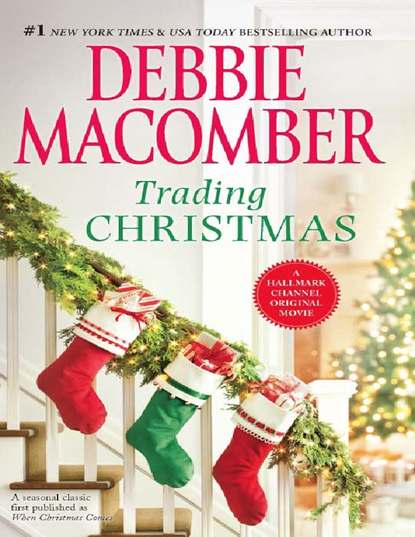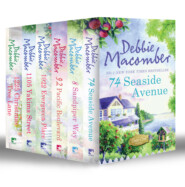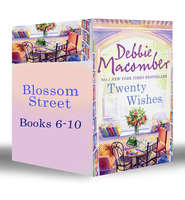По всем вопросам обращайтесь на: info@litportal.ru
(©) 2003-2024.
✖
Trading Christmas: When Christmas Comes / The Forgetful Bride
Автор
Год написания книги
2018
Настройки чтения
Размер шрифта
Высота строк
Поля
“I don’t want neighbors.”
“You don’t?”
The little girl looked crushed.
He didn’t mean to hurt the kid’s feelings, but he wasn’t interested in joining a Christmas commune. He simply wasn’t socially inclined. All he wanted was to be left alone so he could write—and ignore anything to do with Christmas. Clearly, he’d been mistaken about this town—where was the prison? Keeping to his all-work-and-no-Yule agenda was going to be more of a challenge than he’d planned.
“Thank your mother for me, but explain that I came here to work,” he told the little girl, making an effort to mollify her with politeness.
“But it’s Christmas.”
“I’m well aware of the season,” he said, stabbing the key into the lock. “Let your mother know I prefer not to be disturbed.” He hoped the kid would take the hint, too.
Sarah jutted out her lower lip. “Okay.”
Good, she got the message. Charles opened the front door and stepped inside. He should’ve been prepared… . If Leavenworth was Santa’s village, then stepping into this house was like walking into a fairy tale. The furniture was large and old-fashioned and bulky, with lots of lace and doilies. He’d traded homes with Goldilocks. Well, with the Three Bears, anyway. A grandfather clock chimed in the living room and logs were arranged in the fireplace, ready for a match. A knitted afghan was draped across the back of the overstuffed sofa. A green and blue braided rug covered the hardwood floor.
“Oh, brother,” Charles sighed, truly discouraged. He abandoned his suitcase and laptop in the entry and walked into the kitchen. Emily had left him a note propped against the holly wreath that served as a centerpiece on the round oak table. Charles was almost afraid to read it.
After a moment he reached for it, read it, then tossed it in the garbage. She’d left him dinner in the refrigerator. All he had to do was heat it in the microwave.
Dinner. Cookies from the neighbor. “Jingle Bells” in a one-horse open sleigh gliding back and forth in front of the house. If that wasn’t bad enough, the entire street, indeed the whole town, glittered with Christmas lights that blinked from every conceivable corner. This was madness. Sheer madness. He hadn’t escaped Christmas; he’d dived headfirst into the middle of it.
The first thing Charles did before he unpacked was pull down every shade on every window he could find. That, at least, blocked out the lights. He found an empty bedroom, set his suitcase on a chair and took out the work materials he needed.
The doorbell chimed and he groaned inwardly, bracing himself for another confrontation with the Christmas kid. Or her mother, bearing gifts of cookies.
It wasn’t a woman with a plate of cookies or the child who’d accosted him earlier. Instead there were six of them, six children who stared up at him in wide-eyed wonder. They were dressed in winter gear from head to toe, with only their eyes and noses visible behind thick wool scarves and hand-knit hats. Their noses were bright red and their eyes watery. Melting snow dripped puddles onto the porch.
“Do you want to come outside? Go sledding with us?” the oldest of the group asked, his scarf moving where his mouth must be.
“No.” Charles couldn’t think of anything more to add.
“We have an extra sled you can use.”
“I—no, thanks.”
“Okay,” the second-tallest boy answered.
No one budged.
“You sure?” the first boy asked.
Someone shouted from nearby. An adult voice from what he could tell.
“That’s our mom,” one of the children said. The little girl from before.
“We were supposed to leave you alone,” another girl told him. At least he thought it was a girl.
“You should listen to your mother.”
“Do you?”
The kid had him there. “Not always.”
“Us neither.” The boy’s eyes smiled at him and Charles realized he’d made a friend, which was unfortunate.
“Emily said you were a teacher, too.”
“I’m writing a book and I won’t have time to play in the snow.” He started to close the door.
“Not at all?” The oldest boy asked the question with a complete sense of horror.
“It’s Christmas,” another reminded him.
The woman’s voice sounded again, shriller this time.
“We got to go.”
“Bye,” Charles said and, despite himself, found that he was grinning when he closed the door. His amusement died a quick death once he was back inside the house. Despite his attempt to block out all evidence of Christmas, he was well aware that it waited right outside, ready to pounce on him the minute he peeked out.
Grumbling under his breath, he returned to the kitchen and grudgingly set his dinner in the microwave. Some kind of casserole, duly labeled “Charles.” He resisted the urge to call Emily Springer and tell her exactly what he thought of her little Christmas deception. He would, too, if she’d misled him—only she hadn’t. He blamed himself for this. Because he’d just realized something—he’d confused Leavenworth, Washington, with Leavenworth, Kansas.
The doorbell chimed once more, and Charles looked at the ceiling, rolling his eyes and groaning audibly. Apparently he was going to have to be more forthright with the family next door. He stomped across the room and hauled open the front door. He wanted to make it clear that he didn’t appreciate the disturbances.
No one was there.
He stuck his head out the door and glanced in both directions.
No one.
Then he noticed a plate of decorated cookies sitting on the porch. They were wrapped in red cellophane, which was tied with a silver bow. His first instinct was to pretend he hadn’t seen them. At the last second, he reached down, grabbed the plate and slammed the door shut. He turned the lock, and leaned against the wall, breathing fast.
He was in the wrong Leavenworth, but he might as well be in prison, since he wouldn’t be able to leave the house, or even open the door, for fear of being ambushed by Christmas carolers, cookies and children.
Not exactly what he’d had in mind…
Six
Bernice Brewster was beside herself with frustration. For two days she’d tried to reach her son Charles, to no avail. He refused to use a cell phone and the one she’d purchased for him sat in a drawer somewhere. She was sure he’d never even charged the battery.
Growing up in Boston, Charles had been fascinated by history, particularly the original Thirteen Colonies. Now look at him! Granted, that interest had taken him far; unfortunately it seemed to be his only interest. If he wasn’t standing in front of a classroom full of students—hanging on his every word as she fondly imagined—then he was buried in a book. Now, it appeared, he was writing his very own.
Why, oh why, couldn’t her sons be like her friends’ children, who were constantly causing them heartache and worry? Instead, she’d borne two sons who had to be the most loving, kindest sons on God’s green earth, but… The problem was that they didn’t understand one of the primary duties of a son—to provide his parents with grandchildren.
Bernice couldn’t understand where she’d gone wrong. If there was anything to be grateful for, it was that Bernard hadn’t lived long enough to discover what a disappointment their two sons had turned out to be in the family department.
Charles was the younger of the two. Rayburn, eight years his senior, lived in New York City and worked for one of the big publishers there. He insisted on being called Ray, although she never thought of him as anything but Rayburn. He was a gifted man who’d risen quickly in publishing, although he changed houses or companies so often she couldn’t hope to keep track of where he was or exactly what he did. At last mention, he’d said something about the name of the publisher changing because his company had merged with another. The merger had apparently netted him a promotion.











